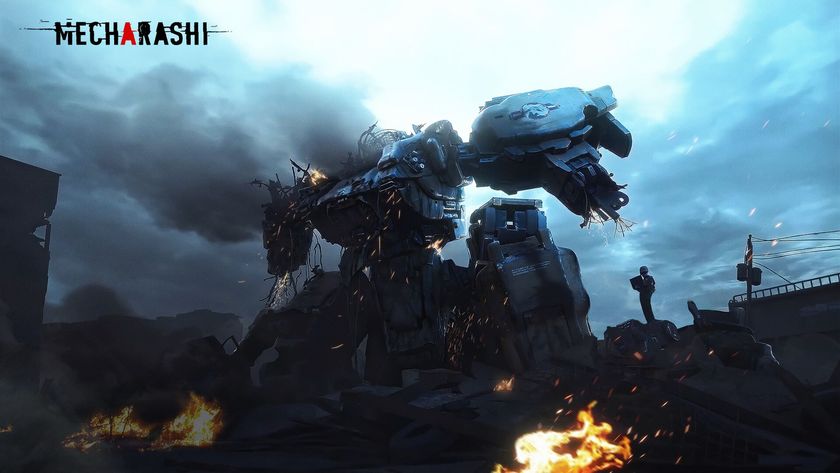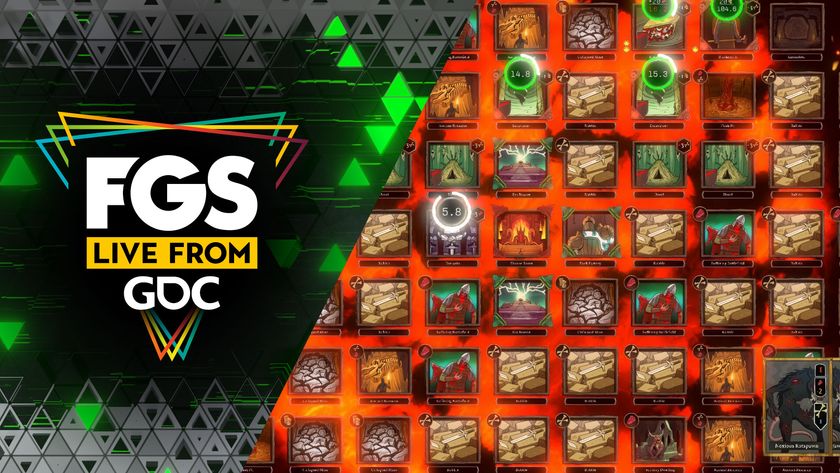Mario + Rabbids Kingdom Battle shouldn’t work but it does - and it proves how healthy the Switch is
Ubisoft's bouncy XCOM analogue is a brilliant oddity that could only exist on Switch
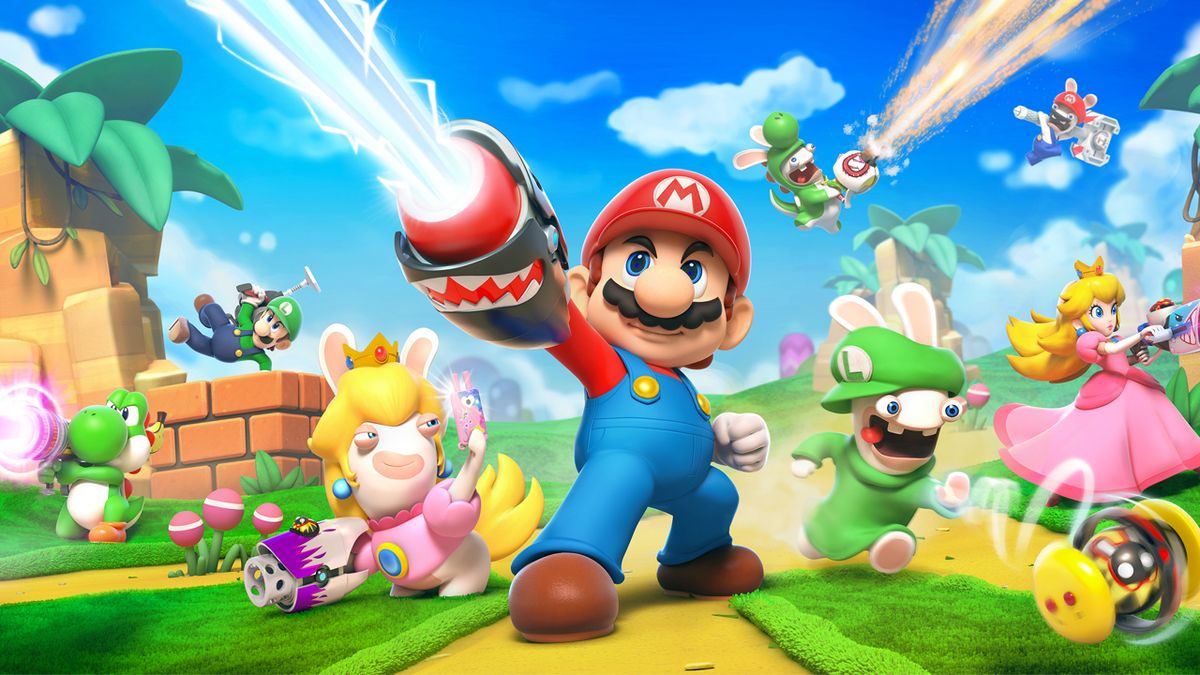
Well, isn’t this a nice surprise? The response to the announcement of Mario + Rabbids Kingdom Battle - complete with cartoon mascots and combat Mario - was one of confusion and gentle hostility. It prompted the standard cries of ‘why is Nintendo working on this instead of [insert favourite unmade Nintendo game]?’ It’s lovely to report, then, that those suspicions are brilliantly unfounded. We were all wrong. Relax.
It’s not just that this isn’t a Nintendo game - it’s actually a Ubisoft game in exuberant dungarees - but that it’s a wonderful, sharply surprising oddity. The clues were there during Ubisoft’s conference at E3 2017: Miyamoto galavanting on stage with Yves Guillemot; the lovely developer man, teary-eyed because his idol loved his work. This isn’t a marketing trick, or another abrasive attempt by Ubi to make us love the unlovable. This is someone’s dream. And it’s really, really good. And also weird. But mostly good.

The obvious facsimile is XCOM, and it’s not Nintendo’s first experience of reimagining Firaxis Games’ ruthless isometric strategy. They tried it before in the imaginative but unbalanced Code Name S.T.E.A.M., developed by Intelligent Systems, which superficially felt like a sleeker fit: aliens, guns, cosmic peril. It almost worked, but it lacked the sense of rigid fairness that makes XCOM so good. Kingdom Battle is a different prospect. If you’re unfamiliar with the system, you take it in turns to navigate a tiled, isometric map. You have an amount of action points you can use for movement and shooting. At the most basic level, you scoot into cover and take potshots at opponents, and each attack has a percentage chance of connecting. Once all your team has used their points, your opponent takes their turn. If you survive - a big ‘if’, in XCOM - you go again once they’re done.
Sure enough, as one of Mario’s targets flipped through the air, he opened fire and shot him out of the sky.
In Mario + Rabbids, this system is simple, clear, and wonderfully easy to grasp. Anyone could play the first level and understand exactly what it wants from you and how it works. But that doesn’t mean it’s dull. Before long I was doing stuff that looked and felt like tactical genius, even if it wasn’t: using shortcuts, outflanking enemies, teaming up to catapult characters across the map. From what I played, the game does a great job of spoonfeeding you the more complicated elements. I honestly thought this would be Baby’s First XCOM, giving you the joy of slotting into cover with none of the finesse, but after 15 minutes, Mario was in overwatch, hunkered down against a chunky block, waiting for an enemy to pop its head out of cover. Sure enough, as one of Mario’s targets flipped through the air, he opened fire and shot him out of the sky. It was a surreal thing to watch, but it felt amazing. And if it’s giving me this now, just imagine what it’s serving up after a few hours.
Chain reaction
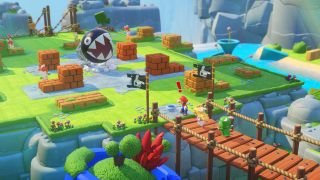
So we’ve established it’s smarter than it looks, then, but there’s more to it than that. Pretty soon, I had to navigate through a courtyard with a massive Chain Chomp, which attacks players and NPCs indiscriminately. It’s useful for taking out the ‘bad’ Rabbids, but dangerous if you get your positioning wrong. It was also my first experience of lumbering, melee focussed enemies that charge you after you’ve attacked. If anything, the bouncy, obvious presentation makes it easier to understand. If you’re too close to the big rabbid when you shoot him, he’ll hit you with his obelix. Simple. It also pushes you through the level at pace by ‘growing’ new enemies in the starting zone. Dilly-dally and you’ll end up fighting twice as many rabbids, and nobody wants that. This was one of the things I disliked about Code Name S.T.E.A.M., but the balance seems about right here. They appeared on a level that was all about running to the exit, so it could be a clever way of forcing you to move quickly, rather than reckless, punitive difficulty.
There’s a cheerful naughtiness to everything that feels like it couldn’t exist in a game developed by Nintendo, and it manages to be endearing instead of irritating. The way it takes established ideas and shapes them into something bright and exciting is representative of Nintendo in 2017, suddenly happy to greedily pick modes from other games and improve them. The XCOM combat was always going to click for me, but I didn’t expect to like the world so much. Another pleasant surprise. You slide through a landscape that’s full of strange, fun touches, that manages to blend the juicy brightness of Nintendo with Ubi’s gallic eccentricity. That’s a wordy way of saying I saw a giant rubber duck in a spiked collar.
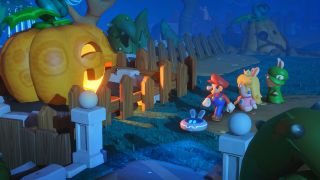
It breaks up the turn-based combat, but there’s stuff to stop and see. It’s also a great way of showing off the animation, which is uniformly excellent. It’s something to whisper in the safety of trusted company, but I think this game made me actually like Rabbids. Just a little bit. I’m not laughing along with their zany antics just yet, and the fact they have stubble still troubles me on an existential level, but I’m no longer swollen with bile when I see them. Progress. The way that Peach Rabbid reclines against cover, like a saucy matinee idol with buck teeth, is magnificent. The tactical sections are fun enough that you’ll want to rush through to the next confrontation, but the world is so bouncy you’ll want to stop and admire it. This was the bit of the game I expected to like the least, but here I am cornering you like a boring uncle at Christmas to tell you a mildly amusing anecdote about a kinky duck. Thanks, Kingdom Battle - nothing makes sense any more.
Sign up to the 12DOVE Newsletter
Weekly digests, tales from the communities you love, and more
Except that it does make sense. The individual parts of Kingdom Battle shouldn't slot together, but they do. The Switch is healthy enough that weird ideas like this are allowed to flourish. It leads to precisely the opposite feeling I had with the Wii U, a machine cheapened by watery third-party games and a catalogue of almost-great Nintendo titles. Kingdom Battle is representative of where the Switch is right now. Nintendo is allowed to gamble. A peculiar strategy game with gurning mascots is a much more viable purchase when you have the safety net of Breath of the Wild, ARMS and Mario Kart 8 Deluxe. Gamers who already having a library of great games have an excuse to try something this challenging. Perhaps it makes perfect sense. Nintendo has always been about making wild ideas work; what could be wilder than a Ubisoft developed, turn-based Mario title that’s secretly the most exciting thing coming to Switch?


